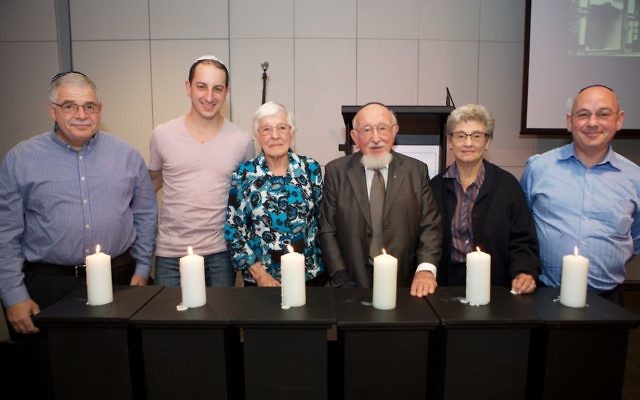‘Where were the good people’s voices?’
HUNDREDS gathered to commemorate the anniversary of Kristallnacht in Sydney and Melbourne last Sunday.
HUNDREDS gathered to commemorate the anniversary of Kristallnacht in Sydney and Melbourne last Sunday.
The Sydney commemoration – co-hosted by the NSW Jewish Board of Deputies (JBOD), the Sydney Jewish Museum (SJM) and the Australian Association of Jewish Holocaust Survivors & Descendants (AAJHS&D) – saw the lighting of six candles in honour of the six million Jews who were murdered in the Holocaust, and heard from author Cheryl Koenig and testimony from the late Gerry Levy and survivor Dr Joachim Schneeweiss.
Addressing the audience, Koenig said the unspeakable horrors Holocaust survivors endured – ones, she said, “we still wince at today” – are impossible to imagine.
“The horror and brutality leave me shamed to be part of a species that could commit such wrongdoing,” she said.
“What disturbs my understanding of our common humanity is who or what kind of society would allow the political and social bacteria of such times – and the cultural indifference – to fester unabated, leaving blameless individuals to suffer the unimaginable. Where were the good people’s voices?”
Koenig said while remembering the terror and barbarity of Kristallnacht, “we must always remember that the greatest of crimes begin with slurs, hatred and prejudices that are not quashed.”
Koenig, whose most recent book With Just One Suitcase details the stories of her father and father-in-law – one, a Jewish youth from Hungary, and the other a kind-hearted Catholic boy who lived a few kilometres away – and their remarkable reconnection in Sydney, also spoke about her family’s history.
“Like so many from that era who were torn from their homelands, cultures and families – literally and metaphorically set adrift – their centre of gravity and sense of belonging was severed,” she said.
“Hence the strength of character shown, valour in the face of oppression, fearlessness to travel halfway around the globe, and inherent work ethic, are just a few of the qualities I truly admire about this generation and believe generations born since will never fully appreciate.”
But valour, daring and imagination “form only part of the mosaic that has combined to create a successful representation of life for the many refugees that continue to grace our sandy shores”, Koenig said.
“Hope and resilience were, and are, of equal importance – creating aspirations; a faithfulness to keep hold of the dream; and eventual accomplishment. These are the qualities of character that allow people to survive and emerge from trials or challenges that beset them.”
JBOD CEO Vic Alhadeff said: “The turnout by over 300 people – including from Greek, Indonesian, Armenian, Assyrian and other communities, plus a range of non-government organisations – speaks volumes as to the importance of marking this occasion.”
In Melbourne, meanwhile, communal veteran Shmuel Rosenkranz has been made the inaugural life governor of the Jewish Holocaust Centre (JHC) for his tireless work over many years.
The honour was bestowed on the 93-year-old Shoah survivor, who was an eyewitness to the horrors of Kristallnacht, at the JHC last Sunday during its annual Kristallnacht commemoration and the presentation of this year’s Betty and Shmuel Rosenkranz Oration.
JHC veterans Willie Lermer and Abe Goldberg officially conferred life governorship on their colleague of many years.
The appointment as life governor, signed by JHC co-presidents Pauline Rockman and Sue Hampel, also marks Rosenkranz’s contribution as a long-serving JHC president.
Addressing his long-time co-worker, Lermer reflected: “You, Abe, and I have served at the centre for many years, together with many others who either survived the Holocaust or fled Europe on the eve of the war.
“When you arrived in Australia in 1939, as a young man, you became active, almost immediately, in the life of the Jewish community and took on various leadership roles. Who would have imagined that a German-speaking yekke [person of Germanic background] would become president of the Federation of Polish Jews!”
In her oration, Dr Avril Alba – lecturer in Holocaust studies and Jewish civilisation in the department of Hebrew, Biblical and Jewish Studies at the University of Sydney – compared the experiences of Holocaust survivors with those of their descendants, who try to relate their forebears’ Shoah experiences to their contemporary lives.
She said museums such as the JHC will continue to be vital resources for transmitting memories of the Holocaust to these generations if they can continue to focus on both particular and universal aspects of the Shoah.
EVAN ZLATKIS AND PETER KOHN


comments